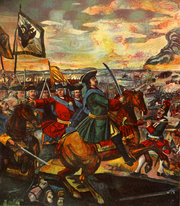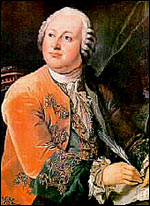Mikhail Lomonosov
|
|
Mikhail Vasilyevich Lomonosov (Михаи́л Васи́льевич Ломоно́сов) (November 19 (November 8, Old Style), 1711 – April 15 (April 4, Old Style), 1765) was a Russian writer and polymath who made important contributions to literature, education, and science.
| Contents |
From peasant to scholar
Lomonosov was born in the village of Denisovka (the name of which was afterwards changed to Lomonosovo in honor of the poet), situated on an island not far from Kholmogory, in the Far North of Russia. His father, a fisherman, took the boy when he was ten years of age to assist him in his work, but his eagerness for knowledge was unbounded. The few books accessible to him he almost learned by heart and, seeing that there was no chance of pursuing education at home, he resolved to go by foot to Moscow.
An opportunity occurred when he was seventeen, and by the intervention of friends he obtained admission into the Zaikonospasski school. There his progress was very rapid, especially in Latin, and in 1734 he was sent from Moscow to Saint Petersburg. There again his proficiency, especially in physical science, was marked, and he was one of the young Russians chosen to complete their education in foreign countries.
Foreign education
He accordingly went to the University of Marburg in Hesse, Germany, then one of the most important European universities - at a time when universities in general were in some decay - because of the presence of the most eminent German Enlightenment philosopher of his time, Christian Wolff. Lomonosov studied with Wolff and became one of his personal students; both philosophically and as a science administrator (also a forte of Wolff), this connection would be most influential for the rest of his life.

During his Marburg time, he also began to write poetry, imitating German authors, among whom he is said to have especially admired Gunther. His Ode on the Taking of Khotin from the Turks was composed in 1739, and attracted a great deal of attention at St. Petersburg. During his residence in Germany, Lomonosov married a native of that country, and found it difficult to maintain his increasing family on the scanty allowance granted to him by the St. Petersburg Academy which, moreover, was irregularly sent. His circumstances became embarrassed, and he resolved to leave the country secretly and to return home.
His achievements
On his arrival in Russia he rapidly rose to distinction, and was made professor of chemistry in the University of St. Petersburg, where he ultimately became rector. Eager to improve Russian education, Lomonosov was engaged in founding the Moscow State University (later named after him) in 1755. In 1764 Lomonosov was appointed to the position of a secretary of state.
As a scientist Lomonosov rejected the phlogiston theory of matter commonly accepted at the time, and anticipated the kinetic theory of gases. He regarded heat as a form of motion, suggested the wave theory of light, and stated the idea of conservation of matter. Believing that nature is subject to regular and continuous evolution, he demonstrated the organic origin of soil, peat, coal, petroleum, and amber.
Lomonosov was the first person to record the freezing of mercury, and to hypothesize the existence of an atmosphere on Venus based on his observation of the transit of Venus of 1761 in a small observatory near his house in Petersburg. In 1745 he published a catalogue of over 3,000 minerals, and in 1760 he explained the formation of icebergs. He also set up a glass factory that produced the first stained glass mosaics outside of Italy.
In 1755 he wrote a grammar that reformed the Russian literary language by combining Old Church Slavonic with the vulgar tongue. To further his literary theories, he wrote more than 20 solemn ceremonial odes, notably the Evening Meditation on the God's Grandeur. To his later poems he applied an idiosyncratic theory that words containing sounds E, I, YU should be used when depicting tender subjects, and those with sounds O, U, Y - to describe things that may cause fear ("like anger, envy, pain, and sorrow"). Lomonosov published his own history of Russia in 1760. Most of his accomplishments, however, were unknown outside Russia until long after his death. He died in St. Petersburg in 1765.
See also
External links
- Illustrated chronology of Lomonosov's life (http://max.mmlc.northwestern.edu/~mdenner/Demo/poetpage/lomonosov.htm)
- Evening Meditation on the Greatness of God on the occasion of the Northern Lights (http://max.mmlc.northwestern.edu/~mdenner/Demo/texts/evening_meds.htm)bg:Михаил Ломоносов
de:Michail Wassiljewitsch Lomonossow eo:Miĥail LOMONOSOV ka:ლომონოსოვი, მიხეილ nl:Michail Lomonosov ja:ミハイル・ロモノーソフ pl:Michaił Łomonosow ru:Ломоносов, Михаил Васильевич sr:Михаил Васиљевич Ломоносов zh:米哈伊尔·瓦西里耶维奇·罗蒙诺索夫

